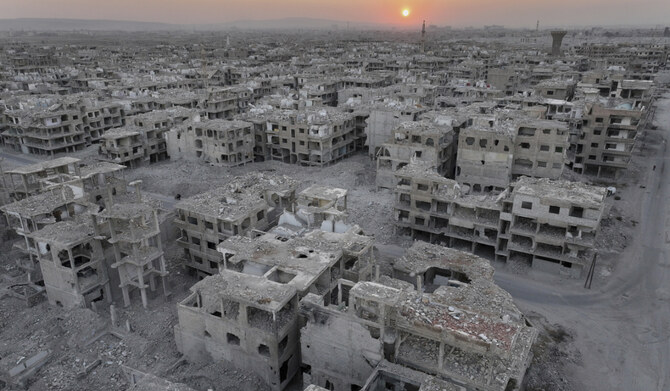DARAA, Syria: Family members of Syrians who disappeared in the country’s 14-year civil war gathered in the city of Daraa on Sunday to urge the newly installed interim government to not give up on efforts to find them.
The United Nations in 2021 estimated that over 130,000 Syrians were taken away and disappeared during the war, many of them detained by former President Bashar Assad’s network of intelligence agencies as well as by opposition fighters and the extremist Daesh group. Advocacy group The Syrian Campaign says some 112,000 are still missing.
When rebels led by the Islamist group Hayat Tahrir Al-Sham overthrew Assad in December, they stormed prisons and released detainees from the ousted government’s dungeons. Families of the missing quickly rushed to the prisons seeking their loved ones. While there were some reunions, rescue services also discovered mass graves around the country and used whatever remains they could retrieve to identify the dead.

Family members hold pictures of their relatives who disappeared in the nearly 14-year Syrian civil war, during a protest calling on the interim government to not give up on efforts to find them, in the city of Daraa, Syria, Sunday, March 16, 2025. (AP)
On Sunday, the 14th anniversary of the countrywide uprisings that spiraled into civil war, Wafa Mustafa held a placard of her father, Ali, who was detained by the Assad government’s security forces in 2013. She fled a week later to Germany, fearing she would also be detained, and hasn’t heard from him since.
Like many other Syrians who fled the conflict or went into exile for their activism, she often held protests and rallied in European cities. Now, she has returned twice since Assad’s ouster, trying to figure out her father’s whereabouts.
“I’m trying, feeling both hope and despair, to find any answer on the fate of my father,” she said. “I searched inside the prisons, the morgues, the hospitals, and through the bodies of the martyrs, but I still couldn’t find anything.”
A United Nations-backed commission on Friday urged the interim government led by Ahmad Al-Sharaa to preserve evidence and anything they can document from prisons in the ongoing search for the disappeared. The commission also urged the new government to pursue perpetrators.
Some foreign nationals are missing in Syria as well, notably American journalist Austin Tice, whose mother visited Syria in January and met with Al-Sharaa. Tice has not been heard from other than a video released weeks after his disappearance in 2012 that showed him blindfolded and held by armed men.
Syria’s civil war began after Assad crushed largely peaceful protests in 2011, one of the popular uprisings against Arab rulers known as the Arab Spring. Half a million people were killed during the conflict, and more than 5 million left the country as refugees.























